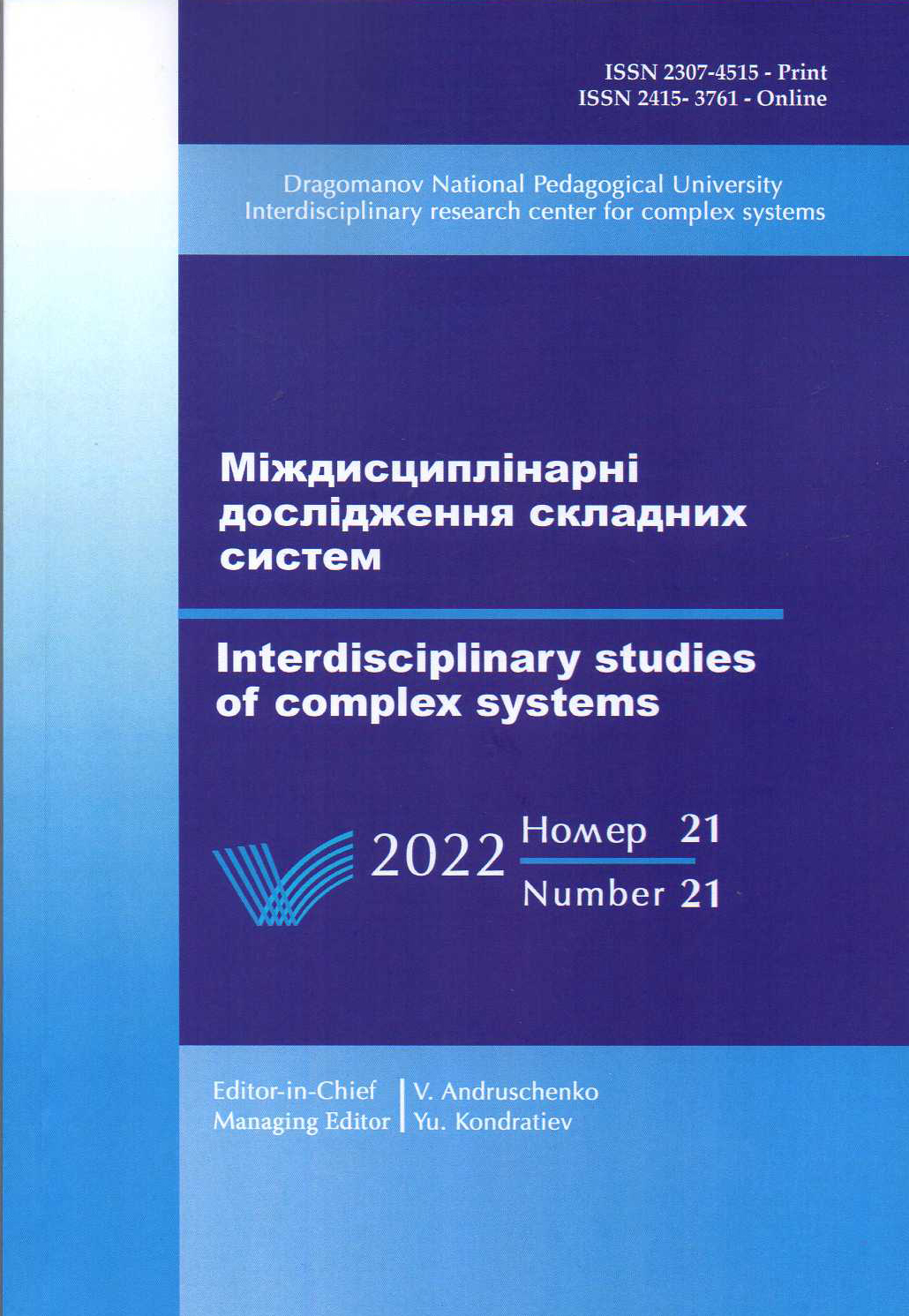Reflection of the earth in modern media reality: philosophical and anthropological foundations of a complicated system
DOI:
https://doi.org/10.31392/iscs.2022.21.047Ключові слова:
media reality, technologies, space, Earth, media turn, network, complicated systemАнотація
The article is devoted to the problem of re�ection the phenomenon of the Earth in the context of media reality. It is shown that the philosophical discourse, based on the media turn, testies to the formation of a new relationship between the components of the “Earth—man—information technology” system, which leads to signi蛻cant transformational shifts. This situation gives rise to a media totality, producing a dominance of images that create a new configuration of the social and the natural. Simpli蛻cation takes place in relation to the environment, due to the blurring of the boundary between the real and the illusory / virtual. It is indicated that these changes require a polyparadigmatic study. The article outlines the specifics of the formation of a new image of the Earth. This situation provokes the elimination of the systemic vision of the Earth and the transformation of the Earth’s space into an electronic, technological, information landscape that corresponds to the network principle of
organization. These landscapes have a direct impact on the organization of socio-cultural practices of modern society. This question articulated the problem of media reality as a new mode of being — articial being.
Посилання
Barker T. 2012. Time and the Digital: Connecting Technology, Aesthetics, and a Process Philosophy of Time. Hanover, N. H.: Dartmouth College Press.
Brereton P. 2005. Hollywood Utopia. Ecology in Contemporary American Cinema. Bristol: Intellect Books.
Burd’e P. 2007. Social’noe prostranstvo i simvolicheskaja vlast’. Sociologija social’nogo prostranstva. Moskva, Sankt Peterburg: ALETEJJa.
[Social space and symbolic power. Sociology of social space]. [in Russian].
Voyakovs‘ky‘j D. 2012. Mental‘ni kordony‘ v Yevropi bez kordoniv. Ky‘yiv: Nika-Centr. [Mental boundaries in Europe without boundaries]. [in Ukrainian].
Gilbert A. J. 2006. Coevolution in Complex Networks: an analysis of socio-natural interactions for wetlands management: PhDdiss. Amsterdam: PrintPartners Ipskamp B V.
Elnashaiea Said S.E.H., Graceb John R. 2007. Complexity, bifurcation and chaos in natural and man-made lumped and distributed systems. Chemical Engineering Science, 62(13), 3295–3325.
Kelsey R. 2011. Reverse Shot: Earthrise and Blue Marble New Geographies. Iss.4: Scales of Earth. Ed. El Hadi Jazairy. Harvard University Press.
Kember S., Zylinska J. 212. Life after New Media: Mediation as a Vital Process. Cambridge, Massachusetts: The MIT Press.
Kultayeva M. 2020. Homo digitalis, dy‘gital‘na kul‘tura i dy‘gital‘na osvita: Filosofs‘ko-antropolgichni i filosofs‘ko-osvitni rozvidky‘. Filosofiya osvity, 1(26): 8-36. [Homo digitalis, digital culture and digital education: philosophical-anthropological and philosophical-educational studies]. [in Ukrainian].
Lovelock J. 2006. The revenge of Gaia: why the earth is fighting back — and how we can still save humanity. Santa Barbara: Allen Lane.
Latour B. 2005. Reassembling the social: An introduction to actornetwork-theory. Oxford: Oxford University Press.
Makljujen M. 2004. Galaktika Gutenberga: Sotvorenie cheloveka pechatnoj kul’tury. Kyiv: Nika-centr. [Gutenberg’s Galaxy: The Creation of Man of Print Culture]. [in Russian].
McLuhan M. 1974. At the Moment of Sputnik the Planet Became a Global Theater in Which There are No Spectators but Only Actors. Journal of Communication, vol. 24, iss. 1: 48–58.
Martin-Jones D. 2018. Cinema Against Doublethink: Ethical Encounters with the Lost Pasts of World History. New York: Routledge.
Neyrat F. 2016. Planetary Antigones: The Environmental Situation and the Wandering Condition. Qui Parle: Critical Humanities and Social Sciences, vol. 25, no. 1–2: 35–64.
Oliver K. 2014. The Excesses of Earth in Kant’s Philosophy of Property. The Comparatist, vol. 38: 23–40.
Шstergaard E. 2017. Earth at Rest: Aesthetic Experience and Students’ Grounding in Science Education. Science and Education, vol. 26, iss. 5: 557–582.
Rassel P. 2011. Planetarnyj mozg: Zemlja probuzhdaetsja. Moskva: Postum. [Planetary Brain: Earth Awakens]. [in Russian].
Rashkof D. 2003. Media Virus! Kak pop-kul’tura tajno vozdejstvuet na vashe soznanie. Moskva: Ul’tra-kul’tura. [Media Virus! How pop culture secretly aɬects your mind]. [in Russian].
Sloterdijk P. 2005. Im Weltinnenraum des Kapitals. Fьr eine philosophische Theorie der Globalisierung. Frankfurt am Main: Suhrkamp.
Somers G. J. 2011 Performing Gaia: Towards a Deep Ecocritical Poetics and Politics of Performance. PhD diss. https://pure.port.ac.uk/ws/portalfiles/portal/6061557/Gareth_Somers_PhD_2_.pdf (Accessed 15 May 2021).
The Thousand Names of Gaia: From the Anthropocene to the Age of the Earth. 2014. September 15–19, Rio de Janeiro: conf.; english version. https://www.researchgate.net/publication/268982536_Alter_geoengineering_The_Thousand_Names_of_Gaia_Conference_English_version. (Accessed 28 June 2021).
Transgumanitarnist‘ yak chy‘nny‘k rozvy‘tku suchasnoyi nauky‘ i osvity‘: metodologichny‘j seminar. 2011. Filosoya osvity, no. 1–2: 97-141. [Transhumanity as a factor in the development of modern science and education: methodological seminar]. [in Ukrainian].
Heidegger M. 1981. “Only A God Can Save Us”: The Spiegel Interview (1966). The Man and the Thinker. Ed. T. Sheehan. Chicago: 45–67.
##submission.downloads##
Опубліковано
Номер
Розділ
Ліцензія
Автори, які публікуються у цьому журналі, погоджуються з наступними умовами:- Автори залишають за собою право на авторство своєї роботи та передають журналу право першої публікації цієї роботи на умовах ліцензії Creative Commons Attribution License, котра дозволяє іншим особам вільно розповсюджувати опубліковану роботу з обов'язковим посиланням на авторів оригінальної роботи та першу публікацію роботи у цьому журналі.
- Автори мають право укладати самостійні додаткові угоди щодо неексклюзивного розповсюдження роботи у тому вигляді, в якому вона була опублікована цим журналом (наприклад, розміщувати роботу в електронному сховищі установи або публікувати у складі монографії), за умови збереження посилання на першу публікацію роботи у цьому журналі.
- Політика журналу дозволяє і заохочує розміщення авторами в мережі Інтернет (наприклад, у сховищах установ або на особистих веб-сайтах) рукопису роботи, як до подання цього рукопису до редакції, так і під час його редакційного опрацювання, оскільки це сприяє виникненню продуктивної наукової дискусії та позитивно позначається на оперативності та динаміці цитування опублікованої роботи (див. The Effect of Open Access).











